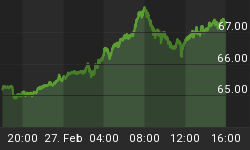As the Russia-Ukraine war ends the third week, oil and commodity markets have recorded massive gains thanks to shuttering of Ukrainian ports, sanctions against Russia and disruption in Libyan oil production and crop and metal buyers scrambling for replacement supplies. Russia is one of the world's biggest exporters of key raw materials, from crude oil and gas to wheat and aluminum, and the possible exclusion of supplies from the country due to sanctions has sent traders and importers into a frenzy.
But it’s not just the commodities markets that are seeing a dramatic re-pricing. The majority of the world’s major currencies have been experiencing extreme volatility, too.
Notably, the U.S. dollar has been making strong gains at the expense of most major world currencies, with the Australian dollar and the New Zealand dollar being the notable exceptions. The dollar has been rising on the back of robust safe haven inflows as well as the Fed’s tightening policy. Central banks around the world have been padding their global reserve currency holdings amid the geopolitical upheavals with the Dollar Index now at two-year highs.
Bearish Euro
Last week, Goldman Sachs co-heads of global FX, rates and EM strategy, Zach Pandl and Kamakshya Trivedi, said the former euro bull thesis was now off the table as long as military conflict continues. Goldman's models suggest that the downgrade to growth expectations across the euro zone subtracted around 1% from the EUR/USD currency pair last week, while an increase in the Europe-wide risk premium--the extra returns an investor can expect for taking on more risk--was worth almost 4%.
In a research note, Goldman's Chief European Economist Sven Jari Stehn and his team has laid out several scenarios and assessed how they might impact the European economy.
"By mapping physical gas supply constraints and upwards price pressures into GVA (gross value added) effects in the Euro area and the U.K., we estimate that for 2022 as a whole high gas prices could weigh on Euro area GDP growth by 0.6pp (percentage points) and the U.K. by 0.1pp relative to our baseline forecast if we assume no further gas supply disruptions," Stehn said.
The impact in Germany is likely to be even greater (-0.9pp), Stehn added, due to its high reliance on Russian gas.
In a worst case scenario in which Russia stops all pipeline exports, Sven and team says Euro area GDP growth is likely to fall by 2.2pp in 2022, with sizable impacts in Germany (-3.4pp) and Italy (-2.6pp).
On a brighter note, a complete stoppage is seen as being unlikely given Russia's reliance on exports to Europe as well as its ever-shrinking sources of revenue elsewhere.
"Although Moscow forged a new deal with Beijing last month to supply China's CNPC with an additional 10 billion cubic meters of gas a year, the new planned pipeline to carry these supplies will take two to three years to complete. In the meantime, Russia will have to rely on its sales to Europe to fund its military incursion in Ukraine and ensure domestic stability," Mathieu Savary, chief European strategist at BCA Research, has told CNBC.
Savary suggested, however, that Novak's threat still highlights the risk of disruption to European energy supplies, which will continue to exert upward pressure on natural gas prices in the near term.
Russian Ruble Craters
Facing one of the harshest sanction campaigns against any nation in modern history, Russia is already in for a world of hurt. StanChart says continuing consumer reluctance to buy from Russia and shortages of capital, equipment, and technology will continue to depress Russian output over, at least, the next three years. To save the Russian currency from total collapse and to combat inflation, Russia’s central bank has raised its key interest rate to a staggering 20%--an all-time high. But that won’t be nearly enough to prevent Russia from descending into a calamitous recession--and the Russian currency has been showing it.
The Russian ruble has lost nearly two-thirds of its value to the dollar in the year-to-date, thanks mainly to the severity of western sanctions imposed on Russia and its financial system that have effectively isolated the country’s economy from the global ecosystem.
The freeze on the Central Bank of Russia's ability to use its $630 billion in foreign reserves has hit particularly hard, with the majority of those reserves denominated in euros and held with EU banks.
But the situation might be even more dire for the ruble.
According to BMO foreign exchange chiefs Greg Anderson and Stephen Gallo, the favorable starting point of Russia's external position prior to the invasion, the lack of a full and immediate ban on EU imports of Russian fossil fuels, and CBR's doubling of the benchmark interest rate to 20% have somewhat mitigated the size of the move in USDRUB. However, the analysts are not optimistic that the current screen price for USD/RUB is an accurate reflection of the true price that Russian citizens and businesses might be forced to pay for USDs if they were to attempt to liquidate their RUB now. In other words, the ruble could be worth far less than what the official exchange rate suggests.
BMO says Russian sanctions have rendered the rouble "highly illiquid,’’ alongside currencies of former Soviet satellite states such as PLN, HUF and Czech koruna (CZK) which are down between 8-12% since the days leading up to the invasion mainly due to capital flight.
"This capital flight is likely coming from both worried local citizens as well as global investors. Liquidity in these currencies is extremely poor, which leaves room for volatility to persist," Anderson and Gallo said.
















